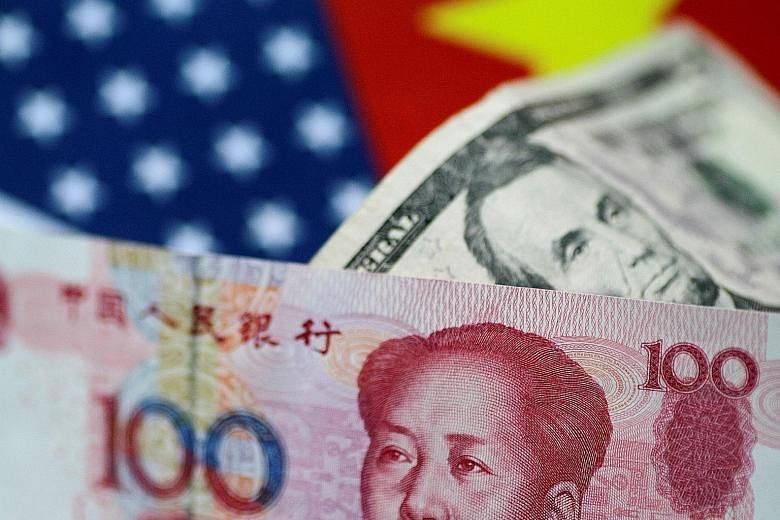SHANGHAI • China's yuan rose sharply against the US dollar yesterday, a day after the central bank assured markets it would keep the currency stable amid heightened worries about trade frictions, although stocks fell.
Chinese currency and equity markets have been volatile ahead of tomorrow, when US tariffs on US$34 billion (S$46.4 billion) of Chinese goods are set to kick in. Beijing has said it would retaliate with tariffs on US products.
The yuan had its worst month on record in June, losing about 3.3 per cent of its value against the greenback, and the slide continued on Monday, the first trading day of July.
But it rebounded on Tuesday after remarks from People's Bank of China (PBOC) governor Yi Gang, and continued to ride the updraft yesterday, putting the yuan on track for its first two-day winning streak since the middle of last month and its best day since late March.
Late yesterday afternoon, US$1 was trading at 6.6126 yuan, about 0.5 per cent stronger than the late-night close on Tuesday.
"Thankfully for regional risk, the PBOC engaged the yuan airbrake yesterday afternoon and, at least for the time being, with the help of Chinese state-owned banks which were seen selling dollars to prop up the Chinese currency, is restoring a sense of calm in regional markets," research outfit Oanda wrote in a note.
A trader at a Chinese bank said the PBOC's signal was clear, but the market would closely watch developments ahead of tomorrow.
"In the short term, the yuan will continue consolidating at the current level, while sharp, one-way falling might have come to an end," the trader said.
Despite the market tumult earlier this week, China appears broadly comfortable with a weakening yuan and would intervene only to prevent any destabilising declines or to restore market confidence, policy insiders told Reuters.
The authorities are also confident they will not have to make heavy use of the official foreign exchange reserves to defend the yuan as they did in 2015, when stocks and the currency went into a tailspin.
However, key Chinese equity indexes were not so reassured, starting the day flip-flopping around Tuesday's closing prices before sliding into negative territory and staying there. The benchmark CSI300 Index ended the day down 1.3 per cent, and the Shanghai Composite Index was off 1 per cent.
A person with knowledge of the plan told Reuters that Chinese tariffs on US$34 billion of US goods would take effect from midnight Beijing time on July 6, in response to the US move. In flagging its first move, Washington said it would implement its tariffs on July 6, but the 12-hour time difference technically puts Beijing ahead in imposing its reciprocal measures.
Also muddying trade ties between the world's two largest economies was a Chinese court ruling that temporarily barred US chipmaker Micron Technology from selling some of its main products in the world's biggest memory chip market.
Separately, Singapore's central bank warned that risks to the global growth outlook have significantly increased due to the intensifying US-China trade row.
"Investors are quite pessimistic at this point, and the downward correction for traditional blue chips, represented by the heavyweight 'Nifty 50' firms, is not over yet," said analyst Wang Mingli of Guoyuan Securities.
An index tracking the 50 most representative blue chips in Shanghai, dubbed China's Nifty 50, slid around 1 per cent to a near 14-month low.
In Hong Kong, the Hang Seng closed down 1 per cent, while an index tracking mainland companies fell about 1.5 per cent.
REUTERS

